Key Takeaways: IPVanish vs ExpressVPN
- The main difference between ExpressVPN and IPVanish is that the former offers top-notch security and privacy, whereas IPVanish falters on the privacy front, mainly because of its data handling procedures.
- Both ExpressVPN and IPVanish have excellent unblocking ability, but the former is the better streaming VPN thanks to its excellent speeds.
- Both IPVanish and ExpressVPN offer seven-day free trials on mobile and a 30-day money-back guarantee in case you change your mind.
ExpressVPN and IPVanish sit on different ends of the VPN spectrum — while ExpressVPN is the best VPN, IPVanish is a mid-tier VPN. However, that doesn’t mean you should forgo IPVanish; as it can be enough in some cases. In our ExpressVPN vs IPVanish guide, we’ll look at the strengths and weaknesses of both VPN providers to help you make an informed decision.
We’ll dissect ExpressVPN and IPVanish to reveal their security, speed, privacy, streaming, torrenting, server location and other capabilities. We’ll add pricing to the equation to help you determine which VPN service is right for you.
-
09/07/2023 Facts checked
We rewrote this guide to include fresh information on the features, usability and performance of ExpressVPN vs IPVanish.
-
1
- : PayPal, Credit card, Bitcoin, PaymentWall
- : 5
- :
- :
- :
- :
Average speedDownload Speed91 MbpsUpload Speed9 MbpsLatency5 ms -
2
- : PayPal, Credit card, Google Pay, Amazon Pay
- : Unlimited
- :
- :
- :
- :
How Did We Rate ExpressVPN vs IPVanish
We put both IPVanish and ExpressVPN through a series of rigorous tests and compared the results side by side. You can read the nitty-gritty details of each VPN’s performance in our full ExpressVPN review and IPVanish review.
IPVanish vs ExpressVPN: Similarities & Differences
As you’ll notice in the table below, ExpressVPN and IPVanish have a few similarities and many differences. We’ll take a deep dive into each category to help you pick the best service for you.
| $6.66 / month(All Plans) 30-days money-back guarantee | $3.33 / month(All Plans) 30-days money-back guarantee | |
| Review | Review | |
| Payment methods | PayPal, Credit card, Bitcoin, PaymentWall | PayPal, Credit card, Google Pay, Amazon Pay |
| Accepts cryptocurrency | ||
| Simultaneous connections | 5 | Unlimited |
| Supports split tunneling | Android only | |
| Unlimited bandwidth | ||
| Free trial available | 7 days (mobile only) | |
| Refund period | ||
| Worldwide server amount | 3,000+ servers in 94 countries | 82 servers in 52 countries |
| Desktop OSes | Windows, MacOS, Linux | Windows, MacOS, Linux |
| Mobile OSes | Android, iOS | Android, iOS |
| Browser extensions | Chrome, Firefox, Edge | Chrome |
| Can be installed on routers | ||
| Can access Netflix US | ||
| Can access BBC iPlayer | ||
| Can access Hulu | ||
| Can access Amazon Prime Video | ||
| Encryption types | 256-AES, ChaCha20 | 256-AES |
| VPN protocols available | OpenVPN, IKEv2, Lightway | IPSec, OpenVPN, L2TP, IKEv2, WireGuard |
| Enabled at device startup | ||
| Allows torrenting | ||
| No-logging policy | ||
| Passed DNS leak test | ||
| Killswitch available | ||
| Malware/ad blocker included | ||
| Live Chat | 24/7 | 24/7 |
| Email support | 24/7 | 24/7 |
| Phone support | ||
| User forum | ||
| Knowledgebase |
Similarities
Keep reading to learn about the similarities between ExpressVPN and IPVanish.
Device Compatibility
Both ExpressVPN and IPVanish offer native Windows, Mac, Linux, smart TV, Android and iOS apps. You can install both on a router to protect home devices such as printers and gaming consoles. Moreover, ExpressVPN and IPVanish have browser extensions for Chrome, Firefox, and other web browsers.
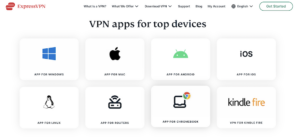
Streaming Performance
ExpressVPN and IPVanish both unblock Netflix libraries around the world on the first attempt. In addition, both VPN services bypass geoblocks on BBC iPlayer, Amazon Prime Video, Peacock, Disney Plus and Max. Most importantly, streaming movies and TV shows is lag- and buffering-free.

the first attempt and streams without interruptions.
The only thing holding IPVanish back from a spot on our best VPNs for streaming list is that sometimes videos take a little while to load, mainly when accessing streaming services abroad. However, recent performance suggests that it is edging closer to a spot on that list. For its part, ExpressVPN loads videos like local sessions, even when connecting to servers several continents away.
Money-Back Guarantee and Free Trial
ExpressVPN and IPVanish offer a seven-day free trial on Android and iOS devices. ExpressVPN doesn’t offer a free trial on desktop, but IPVanish lets you use the mobile free trial logins to give the service a whirl on Windows and Mac devices.
Remember to cancel the free trial at least 24 hours before it ends. If you don’t, IPVanish will automatically upgrade you to a one-year plan, whereas ExpressVPN upgrades you based on the plan you chose: one year or six months.
ExpressVPN and IPVanish offer a 30-day money-back guarantee if you need more time to test the service for free. However, this is different from a usual free trial. While you’ll still be charged, you get a full refund when you cancel your subscription within 30 days. Read our guide to learn how to get an ExpressVPN refund.
Kill Switch and DNS Leak Protection
Both ExpressVPN and IPVanish offer a kill switch — an always-on security feature that cuts internet traffic when the VPN connection drops. Read our full kill switch guide to learn more.
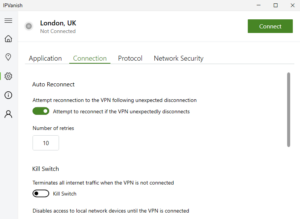
There are two differences, though. First, ExpressVPN offers a kill switch on all major operating systems, while the IPVanish kill switch only works on Windows, Mac and Android devices.
Second, ExpressVPN’s kill switch cuts communication between your devices and other local network devices, such as printers and file servers. You have to flip the switch under the network lock to enable access to local network devices.
On the contrary, when the IPVanish kill switch is active, your computer still communicates with local network devices. You have to toggle on the “block LAN traffic” switch to block access to local network devices when the VPN connection drops.
Beyond the kill switch, ExpressVPN has built-in IPv6 and DNS leak protection, which prevents traffic leaks that could reveal your identity, location and other personal data. IPVanish offers DNS leak protection, but doesn’t support IPv6 protection. Learn why this feature is vital in our comprehensive DNS leak guide.
Perfect Forward Secrecy
Both VPNs support perfect forward secrecy (PFS), which randomly generates encryption keys for each session. In other words, they purge and regenerate new keys when you terminate a VPN connection or change the connection network.
However, if your sessions are long, ExpressVPN creates new encryption keys every 15 minutes. IPVanish doesn’t offer a similar feature. Read our perfect forward secrecy guide to learn its benefits.
Obfuscation
Obfuscation is helpful if you’re in a country where VPNs are banned. This feature blends your VPN traffic with regular web traffic, making it difficult for anyone to detect VPN use.
Obfuscation is built into every ExpressVPN server, meaning it cloaks your VPN traffic regardless of the VPN server you choose. IPVanish VPN obfuscation only works with the OpenVPN protocol, and you have to toggle the “scramble” button on to activate it.
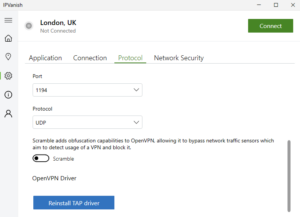
Differences
Now let’s dive into the differences in comparing IPVanish vs ExpressVPN, starting with their usability.
User-Friendliness
ExpressVPN’s native apps are aesthetically pleasing, sleek and clutter-free. The home tab features a large connection button, a location picker and a logically-organized menu. As a result, picking a VPN server, customizing VPN security and performing other functions is easy.
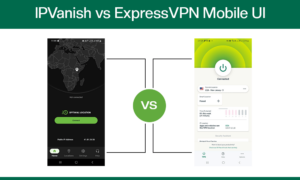
The same can’t be said about IPVanish. The mobile and desktop apps aren’t bad, but they don’t offer the sleekness and clutter-free feel of ExpressVPN. In particular, the extra connection details and world map with pins representing IPvanish server locations hurt the aesthetics.
IPVanish’s design doesn’t impact usability significantly. The learning curve is slightly steeper than ExpressVPN, but you’ll still find your way around the app. The provider also offers a dark mode, something you don’t get with ExpressVPN.
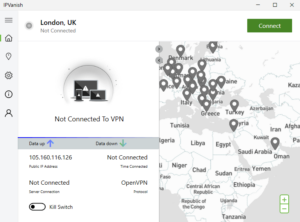
Connection Stability
The real kick in IPVanish’s teeth is the occasionally unstable connections. During our testing, we had instances where IPVanish took too long to establish a connection. In other cases, the app established connections almost instantly but kept disconnecting and reconnecting.
If you need a smoother experience, pick ExpressVPN — the best VPN for beginners. The VPN connects almost immediately, whether you choose a nearby or far-away server. More importantly, each connection is stable, so you don’t have to worry about the VPN inadvertently disconnecting in the middle of a captivating movie or TV show.
Smart DNS Feature
In addition to the native apps, ExpressVPN offers a smart DNS feature called MediaStreamer. This feature allows you to unblock streaming services on devices that don’t support native VPN apps, such as an old smart TV.
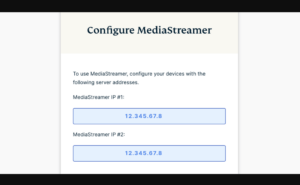
However, the smart DNS doesn’t offer VPN protection; it only changes your IP address. With that in mind, we recommend you use MediaStreamer only on secure networks. In addition, MediaStreamer offers U.S. and U.K. IP addresses, and can only access streaming services in those two countries.
Connection Speed
Unlike ExpressVPN, IPVanish isn’t on our automated speed testing roster. For this reason, we tested the VPNs manually on a 5 Mbps internet connection to level the playing field and get an accurate comparison.
Speed Test With OpenVPN Protocol
To begin, we tested ExpressVPN and IPVanish using the OpenVPN protocol, which both services support. Here are the speed results:
| Location | Download | Upload | Latency |
|---|---|---|---|
| Base: Kenya | 4.98 | 4.78 | 34 |
 Atalanta Atalanta |
4.453.61 | 4.043.02 | 532464 |
 London London |
4.663.17 | 4.323.69 | 430290 |
 Melbourne Melbourne |
4.713.13 | 4.033.42 | 565563 |
 Sao Paulo Sao Paulo |
2.783.41 | 3.743.37 | 793736 |
 Johannesburg Johannesburg |
3.432.75 | 1.812.90 | 206248 |
 Singapore Singapore |
3.433.22 | 4.504.05 | 403391 |
| Average | 3.913.20 | 3.743.41 | 488448 |
Green = IPVanish
Numbers don’t lie. ExpressVPN proved once again why it’s the fastest VPN after NordVPN. On average, ExpressVPN delivered faster download and upload speeds than its competitor, losing to IPVanish on the latency front only.
ExpressVPN hit high download speeds in the U.S., the U.K. and Australia. Given that we performed the tests in Kenya, this demonstrates that ExpressVPN’s speed doesn’t dip with distance. If you’re accessing a streaming service continents away, you’ll get a smooth, interruption-free experience thanks to its fast download speed.
Speed Test With Lightway and WireGuard
We also tested both ExpressVPN and IPVanish using two modern protocols, Lightway (on ExpressVPN) and WireGuard (on IPVanish).
| Location | Download | Upload | Latency |
|---|---|---|---|
| Base: Kenya | 4.98 | 4.78 | 34 |
 Atalanta Atalanta |
4.314.03 | 4.024.10 | 530466 |
 London London |
3.653.62 | 4.303.61 | 274285 |
 Melbourne Melbourne |
3.603.99 | 3.743.70 | 650643 |
 Sao Paulo Sao Paulo |
3.683.32 | 3.922.94 | 795742 |
 Johannesburg Johannesburg |
4.512.13 | 3.314.45 | 142174 |
 Singapore Singapore |
4.234.65 | 4.560.15 | 318395 |
| Average | 4.003.62 | 3.983.16 | 452451 |
Green = IPVanish
As we expected, the Lightway protocol proved faster than OpenVPN, and ExpressVPN delivered faster download and upload speeds than IPVanish. In addition, ExpressVPN’s latency also improved significantly with the Lightway protocol, putting it more on par with IPVanish.
Overall, ExpressVPN is faster than IPVanish, regardless of the protocol. This makes it the better VPN service for streaming, torrenting and other speed-intensive activities.
Security
When it comes to VPN security, we evaluate two vital features: VPN protocols and encryption.
VPN Protocols
By default, ExpressVPN supports “automatic” protocol options, meaning it picks the most appropriate protocol based on your connection. IPVanish supports WireGuard by default on all major operating systems. You can still change the protocol manually based on what’s available on your device.
ExpressVPN offers its proprietary Lightway protocol and OpenVPN on Windows, Android and Linux devices. Mac users can use Lightway, OpenVPN and IKEv2, whereas iOS users have access to Lightway (UDP or TCP) and IKEv2 only.
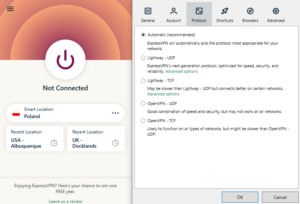
IPVanish still supports the less secure IPSec protocol on all devices except Windows. Beyond that, the provider offers WireGuard, OpenVPN and IKEv2 on Windows, Mac, Android, Linux and iOS. You can read our VPN protocol guide to learn how these protocols differ in speed and security.
Encryption Standard
Both providers support AES 256-bit encryption, which works seamlessly with OpenVPN. In addition, ExpressVPN and IPVanish support ChaCha20 encryption, which works with the WireGuard and Lightway protocols. Both AES 256-bit and ChaCha20 are powerful, but the latter is faster.
Split Tunneling Feature
Split tunneling lets you route specific app traffic via the VPN tunnel while allowing other traffic sources to use the internet unprotected. For example, you can route torrent client traffic through the VPN for optimal security while surfing the web unprotected to maximize internet connection speed.
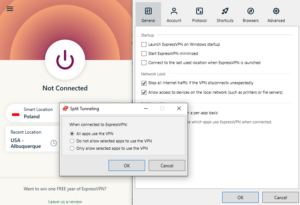
Both VPN providers support app-based split tunneling but on different devices. ExpressVPN offers the feature on Windows, Android, Mac and routers. On the contrary, split tunneling is available on the IPVanish Android app only.
Privacy
According to ExpressVPN’s privacy policy, the provider doesn’t collect user logs, including traffic destination, browsing history, DNS queries and data content. KPMG audited ExpressVPN’s systems, including the server infrastructure, and found it to adhere to the strict privacy policy.
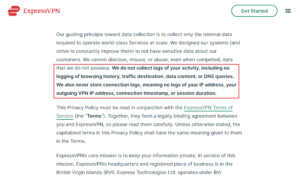
browsing history or personal information.
Likewise, IPVanish makes a no-logs claim in its privacy policy. Our experts examined the claim and found some issues worth considering. The provider claims to retain the right to “process your personal data.”
We dug deeper and found that per IPVanish no-logs policy, “processing” means, amongst other things, “disclosure by transmission, dissemination or otherwise making available, alignment or combination, restriction, erasure or destruction.”
Considering IPVanish has cooperated with the FBI before, the data processing clause raises a real red flag. It means that by acceding to IPVanish privacy policy, you give the provider the right to share or hand over your data to investigation agencies in the case of a subpoena.
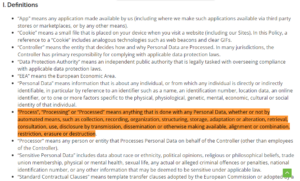
VPN Provider Jurisdiction
Another concern with IPVanish is that it’s headquartered in the United States. The U.S. isn’t a privacy-friendly country, mainly because it’s part of the Five Eyes surveillance alliance. Read our Five Eyes, Nine Eyes and Fourteen Eyes guide to learn why you should avoid VPNs based in these jurisdictions.
ExpressVPN’s parent company, Kape Technologies, is based in the U.K. However, the VPN provider operates as an independent entity based in the British Virgin Islands.
Like the United States, the British Virgin Islands has no mandatory data retention laws but isn’t part of any surveillance alliance. Another plus is that ExpressVPN doesn’t share the limited data it collects with its parent company and its affiliates.
RAM-Only Servers
ExpressVPN uses its TrustedServer technology — a fancy name for RAM-only servers — on all its servers. RAM-only, or diskless, servers automatically wipe all data with every reboot. Doing so prevents the servers from retaining user logs or data.
On the other hand, IPVanish doesn’t use RAM-only servers. Servers that rely on hard drives can become a privacy risk if such a server is seized or hacked before the provider manually deletes the data.
Ad & Malware Blocker
ExpressVPN has a built-in web tracker blocker called Threat Manager. The tool is available on iOS, Mac and Linux devices. You can activate Threat Manager on ExpressVPN’s Aircove router to protect all devices, including Windows, Android, smart TVs and gaming consoles. Sadly, IPVanish doesn’t offer a similar feature.

Server Locations
This section looks at how the VPN providers compare in terms of server spread and count. ExpressVPN has an edge over IPVanish on both fronts.
| Regions: | Countries |
 Countries |
Locations |
 Locations |
| N.America | 6 | 4 | 32 | 25 |
| S.America | 10 | 5 | 11 | 5 |
| Europe | 47 | 32 | 65 | 38 |
| Asia | 24 | 7 | 31 | 7 |
| Africa | 4 | 1 | 4 | 1 |
| Oceania | 2 | 2 | 8 | 6 |
| Middle East | 1 | 1 | 1 | 1 |
| Total | 94 | 52 | 152 | 83 |
ExpressVPN has thousands of servers in 152 locations across 94 countries. IPVanish has over 2,200 in 83 locations across 52 countries.
IPVanish allows you to drill down and pick a specific server in each location. For example, when you open the Atlanta (U.S.) location, you’ll see a list of servers with their corresponding ping and load details, so you can pick a server with low latency and load for optimal performance. ExpressVPN doesn’t offer a similar feature.
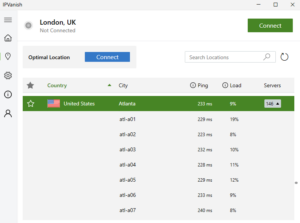
to pick the right server for optimal performance.
Simultaneous Connections
Simultaneous connections refer to the number of devices that can be connected to the VPN at the same time. IPVanish allows you to connect unlimited devices simultaneously.
ExpressVPN allows you to connect five simultaneous connections on the monthly plan and eight on extended plans. However, if you need to protect more than eight devices, you can install the VPN app on your router. While the router counts as one simultaneous device, it protects all connected devices.
Pricing
Every VPN has a downside, and for ExpressVPN, that’s pricing. The VPN provider sits on the higher side of the pricing spectrum. The monthly plan costs $12.95, but you can save a lot with extended plans. The six-month plan costs $9.99 per month, whereas the yearly plan sets you back $6.66 per month when counting the 3 extra months.
IPVanish’s monthly plan is $11.99, a dollar cheaper than ExpressVPN. The yearly plan is even more affordable, at $4.50 per month. The two-year plan goes for $3.33 per month — IPVanish’s best deal.
Customer Support
Both VPN providers offer a knowledgebase, email support and live chat. Live chat with both providers is a quick way to resolve your issues. You can access the help center from within the ExpressVPN or IPVanish app.
You can also contact IPVanish by phone via one of the phone numbers in the U.S., the U.K., Mexico, Spain, Brazil or Australia. Additionally, IPVanish offers support via its Twitter and Facebook channels. ExpressVPN doesn’t offer phone or social media support.
Which Is Better: IPVanish vs ExpressVPN?
There’s no doubt that ExpressVPN is better than IPVanish. It offers faster connection speeds, better privacy and a more extensive server network than IPVanish. Moreover, ExpressVPN comes with features you don’t get with IPVanish, such as an ad and tracker blocker and split tunneling on desktop devices.
IPVanish’s missing features may have relegated it to the second spot, but it didn’t go down without a fight. It offers affordable pricing, unlimited connections and phone support, vital features you don’t get with ExpressVPN. However, despite these, IPVanish fell short of a top-spot performance.
We Recommend IPVanish If You Want…
- To protect unlimited devices: IPVanish offers unlimited simultaneous connections.
- An affordable VPN: IPVanish monthly plan is pricey, but extended plans are cheaper than any offered by ExpressVPN.
- To unblock streaming services: IPVanish unblocks major streaming platforms with ease.
We Recommend ExpressVPN If You Want…
- Interruption-free streaming: ExpressVPN offers blazing-fast speeds and great unblocking ability — the perfect combination for a streaming VPN.
- A VPN for beginners: ExpressVPN’s apps offer a flat learning curve for all users, thanks to their sleek and clutter-free user interfaces.
- Top-notch security and privacy: ExpressVPN offers robust protocols and encryption and adheres to its strict no-logs policy.
If You Want to Consider Other Services, Check Out…
-
1
- : PayPal, Credit card, Google Pay, AmazonPay, ACH Transfer, Cash
- : 6
- :
- :
- :
- :
Average speedDownload Speed94 MbpsUpload Speed9 MbpsLatency4 ms -
2
- : PayPal, Credit card
- : Unlimited
- :
- :
- :
- :
Average speedDownload Speed94 MbpsUpload Speed9 MbpsLatency2 ms -
3
- : PayPal, Credit card
- : Unlimited
- :
- :
- :
- :
Average speedDownload Speed96 MbpsUpload Speed9 MbpsLatency107 ms -
4
- : Credit card
- : 5
- :
- :
- :
- :
-
5
- : PayPal, Credit card, bitcoin, Amazon Pay
- : 7
- :
- :
- :
- :
Average speedDownload Speed70 MbpsUpload Speed9 MbpsLatency49 ms
The Verdict: Why We Think ExpressVPN Wins Overall
ExpressVPN is our overall winner thanks to its faster connection speeds, better privacy, superior user-friendliness, more server locations and features such as MediaStreamer.
Missing features, such as an ad blocker and desktop split tunneling, ruined IPVanish’s chances of a top spot. We also don’t like its data processing procedures, and its cooperation with the FBI in the past could put you off if you’re privacy-conscious.
Have you used ExpressVPN or IPvanish? Do you agree with our verdict? Should IPvanish have won some rounds over ExpressVPN? Leave your comments below, and as always, thanks for reading.
FAQ: IPVanish vs ExpressVPN Compared
-
Overall, ExpressVPN is the best VPN on the market right now. It dominates nearly all the critical categories except speed, where it comes in second after NordVPN.
-
ExpressVPN’s biggest downside is its hefty pricing.
-
No, ExpressVPN offers top-notch security and privacy, and chances of being traced are close to zero.
{“@context”:”https:\/\/schema.org”,”@type”:”FAQPage”,”mainEntity”:[{“@type”:”Question”,”name”:”Is There a Better VPN Than ExpressVPN?”,”acceptedAnswer”:{“@type”:”Answer”,”text”:”
Overall, ExpressVPN is the best VPN on the market right now. It dominates nearly all the critical categories except speed, where it comes in second after NordVPN.\n”}},{“@type”:”Question”,”name”:”What Is the Downside of ExpressVPN?”,”acceptedAnswer”:{“@type”:”Answer”,”text”:”
ExpressVPN\u2019s biggest downside is its hefty pricing.\n”}},{“@type”:”Question”,”name”:”Can ExpressVPN Be Traced?”,”acceptedAnswer”:{“@type”:”Answer”,”text”:”
No, ExpressVPN offers top-notch security and privacy, and chances of being traced are close to zero.\n”}}]}
The post ExpressVPN vs IPVanish in 2023: Two VPNs Going Head-to-Head appeared first on Cloudwards.


